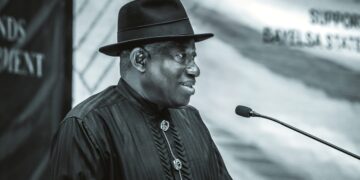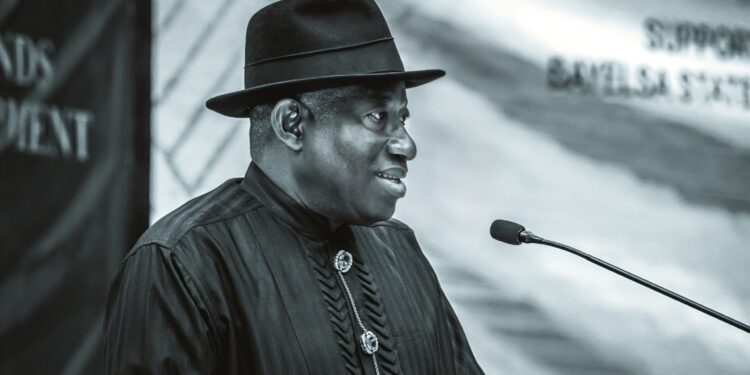By Emmanuel Nduka
Former President Goodluck Jonathan has expressed that his experiences as an election observer across Africa and globally revealed that elections in Ghana, Senegal, and Liberia were superior to those held in Nigeria and other African nations.
While addressing heads of electoral bodies, civil society groups, politicians, and representatives from the European Union and the Economic Community of West African States (ECOWAS) in Abuja on Tuesday, February 25, Jonathan underscored the importance of political actors prioritizing the will of the people in all democratic settings.
Speaking as the guest of honor at the Reflection Conference on Elections in West Africa, organized by Yiaga Africa, Jonathan noted the significant strides West Africa had made in its democratic journey. While acknowledging the disruptions in countries like Mali, Guinea, Burkina Faso, and Niger due to military coups, he emphasized that these setbacks should not overshadow the fact that democracy is flourishing in other parts of the region, which has moved away from its past of absolute authoritarianism.
He pointed out countries such as Nigeria, Senegal, Togo, Sierra Leone, Liberia, and Ghana, which held elections during the 2023 and 2024 cycles, as examples of successful democratic governance in the region.
Commenting on Nigeria’s elections, which were part of the discussions at the two-day conference aimed at drawing lessons from elections held across West Africa, Jonathan highlighted both the advances and challenges in the process. Despite the introduction of the Bimodal Voter Accreditation System (BIVAS) and the Result Viewing Portal (IReV) by the Independent National Electoral Commission (INEC) to enhance transparency, Jonathan noted logistical issues like delayed voting, violence, and technical glitches with BIVAS. These issues, he pointed out, led to numerous lawsuits.
He also referenced Sierra Leone’s 2023 elections, where biometric voter accreditation was introduced for the presidential, parliamentary, and local council elections. Despite technological advancements, he noted allegations of irregularities, including voter intimidation, ethnic tensions, and disputed results, which led to an opposition boycott of governance institutions.
Turning to Ghana’s elections in December 2024, Jonathan praised them as a notable success, even with limited technological applications. He commended Ghana for conducting peaceful elections and ensuring a smooth power transition. He credited Ghana’s Electoral Commission and security authorities for their role in maintaining transparency and fairness, proving that the country’s democratic institutions continue to thrive despite limited technological use.
Similarly, Jonathan praised the elections in Liberia and Senegal. In Liberia, he highlighted the peaceful, transparent, and credible election process, which culminated in a democratic transition when incumbent President George Weah conceded defeat to opposition candidate Joseph Boakai in a closely contested runoff. In Senegal, despite pre-election protests and concerns about the judiciary’s independence, Jonathan noted that once the election process began, it proceeded smoothly, with the final outcome being free and fair. He described Senegal’s election as one of the best he had observed in Africa, underscoring the importance of the human element over technology in the electoral process.
Jonathan expressed his belief that while technology can enhance election transparency, it can also be manipulated, undermining democracy. He recalled past Nigerian elections where voter registers did not exist, yet the process was still accepted, and democracy thrived. He shared his personal experience from the 2015 presidential election, when the card reader system rejected his vote and caused significant unrest. He pointed out that while Nigeria had moved from the card reader to the more advanced BIVAS, the system’s problems had escalated rather than improved.
Jonathan criticized the current state of technology in elections, saying, “While we are progressing in terms of technologies, the outcome is retrogressing. This is not what we expect today.”
He called on electoral bodies across the region to ensure that only living, eligible citizens are included on voter registers. He also emphasized the need for impartial judicial bodies to handle election disputes.
Among his key recommendations were establishing an independent electoral commission, ensuring non-partisan security institutions, periodically reviewing electoral laws, fostering tolerance among political parties and stakeholders, and prioritizing national interests over personal or regional ones.




































